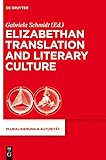Elizabethan Translation and Literary Culture / ed. by Gabriela Schmidt.
Material type: TextSeries: Pluralisierung & Autorität ; 36Publisher: Berlin ; Boston : De Gruyter, [2013]Copyright date: ©2013Description: 1 online resource (393 p.)Content type:
TextSeries: Pluralisierung & Autorität ; 36Publisher: Berlin ; Boston : De Gruyter, [2013]Copyright date: ©2013Description: 1 online resource (393 p.)Content type: - 9783110293029
- 9783110316209
- Literature -- Translations into English -- History and criticism
- Translating and interpreting -- Great Britain -- History -- 16th century
- Elisabethanisches Zeitalter
- England
- Nationalliteratur
- Volkssprache
- Übersetzung
- LITERARY CRITICISM / European / General
- Elizabethan period
- England
- National literature
- Translation
- Vernacular
- 418.02094209031 23
- PR428.T7 E45 2013
- online - DeGruyter
- Issued also in print.
| Item type | Current library | Call number | URL | Status | Notes | Barcode | |
|---|---|---|---|---|---|---|---|
 eBook
eBook
|
Biblioteca "Angelicum" Pont. Univ. S.Tommaso d'Aquino Nuvola online | online - DeGruyter (Browse shelf(Opens below)) | Online access | Not for loan (Accesso limitato) | Accesso per gli utenti autorizzati / Access for authorized users | (dgr)9783110316209 |
Frontmatter -- Acknowledgements -- Contents -- Introduction -- Part I: Translation and Literary Theory -- Elizabethan Translation – A Polyphonic Art: Reconciling the Demands of Letter and Spirit -- Elizabethan Defences of Translation, from Rhetoric to Poetics: Harington’s and Chapman’s “Brief Apologies” -- “Mine own and not mine own”: The Gift of Lost Property in Translation and Theatre -- Enacting the Classics: Translation and Authorship in Ben Jonson’s Poetaster -- “All gentilmen dooe speake the courtisane”: Negotiations of the Italian Questione della lingua in William Thomas and the Florios -- “Ex rebus ipsis non solum ex libris”: Translating the Arts and Sciences in Elizabethan England -- Part II: Translation and Literary Practice -- The Province of Verse: Sir Thomas More’s Twelve Rules of John Picus Earle of Mirandula -- Translation, Authorship, and Gender: The Case of Jane Seager’s Divine Prophecies of the Ten Sibills -- Travelling Translations: Classical Literature in Mid-Sixteenth-Century England -- Appropriating France in Elizabethan Drama: English Translations of Robert Garnier’s Plays -- The Framing of Fiammetta: Gender, Authorship, and Voice in an Elizabethan Translation of Boccaccio -- “Did Ariosto write it?” – (Mis)translating Women in Sir John Harington’s Version of Orlando Furioso -- “It is I that am the right Sancho Pansa, that can tell many tales”: Thomas Shelton’s Translation of Don Quixote (1612/1620) -- List of Contributors -- Index of Names
restricted access online access with authorization star
http://purl.org/coar/access_right/c_16ec
Reversing F. O. Matthiessen's famous description of translation as “an Elizabethan art”, Elizabethan literature may well be considered “an art of translation”. Amidst a climate of intense intercultural and intertextual exchange, the cultural figure of translatio studii had become a formative concept in most European vernacular writing of the period. However, due to the comparatively marginal status of English in European literary culture, it was above all translation in the literal sense that became the dominant mode of applying this concept in late 16th-century England. Translations into English were not only produced on an unprecedented scale, they also became a key site for critical debate where contemporary discussions about authorship, style, and the development of a specifically English literary identity converged. The essays in this volume set out to explore Elizabethan translation as a literary practice and as a crucial influence on English literature. They analyse the competitive balancing of voices and authorities found in these texts and examine the ways in which both translated models and English literary culture were creatively transformed in the process of appropriation.
Issued also in print.
Mode of access: Internet via World Wide Web.
In English.
Description based on online resource; title from PDF title page (publisher's Web site, viewed 28. Feb 2023)


